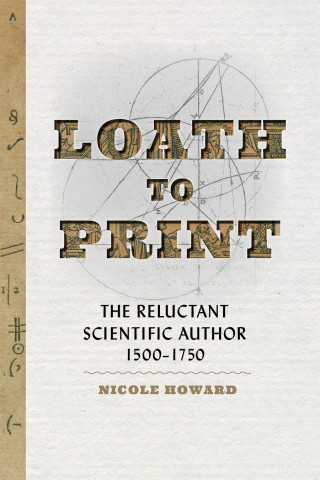
Johns Hopkins UniversityEst. 1876
America’s First Research University
When your research surprises you...

The most surprising thing that I learned in writing this book, and the thing I hope readers take away from it, is as simple as it is counterintuitive: early modern scientists really didn’t like the printing press. The technology that proved so transformative in the Renaissance was looked at by many scientific authors with disdain. Why they felt that way, and what they did in response, lies at the heart of Loath to Print.
Reading through the vast correspondence of men like Christiaan Huygens, Henry Oldenburg, René Descartes, and others, I was struck by how frequently they expressed contempt for the publishing process. The reasons were numerous. Some worried about offending the censors; others fretted over the prospect of unprepared readers. Often, scientific authors bemoaned the hassles that would follow publication, when antagonists came out of the shadows to dispute a work’s arguments or, perhaps worse, claim the ideas as their own. The authors of books about astronomy, mathematics, natural philosophy, and medicine also lamented the arduous path toward publication—practical hassles of dealing with print shops, haggling over paper costs, suffering compositor errors—often wishing that they could simply share their work with the people they most respected and then be left alone.
At some point in my research I started to generate a list of the complex and often overlapping concerns scientists had about printing their work, a kind of taxonomy of grievances. Doing so allowed me to understand that the path from scientific theory to printed book was anything but linear, and that authors had good reasons to steer clear of that path if they could find an alternative route. It was at that point that I began to explicitly link concerns about print with the array of publication strategies I had encountered over the years.
Some authors tried to warn off readers in their prefaces, often through elaborate rhetorical posturing, and at times in a blatantly condescending tone. Others tried to get out in front of the public reception of their work by circulating copies to their desired readers ahead of time. As they angled for ways around traditional publication, these authors availed themselves of alternatives both old and new, from circulating manuscripts among friends, to presenting ideas in scientific journals. A few even tried to develop their own small-batch printing technologies. In the book I look at these and other strategies for dealing with the pressures of print. But ultimately, I come back to the idea that print technology, though profoundly important in the intellectual history of early modern Europe, was viewed in complex and at times unfavorable ways by scientific authors.
While I hope my book sheds some light on early modern science and print, I also hope its argument has some modern resonance, especially given the place of science in society today. The individuals I study were frequently troubled by the reception they received, particularly from readers they deemed “unfit” to assess their work. If print made their ideas available to a wider swath of society, it had done so at some cost to the author. In correspondence, the elitism of many authors—and their insistence that the public was neither equipped nor entitled to respond to their ideas—is on full display. Such a gap between the scientific community and the lay public is a fact of life today, but I think it is important to reflect on how deeply rooted this chasm is in our history, and how the predecessors to modern scientists worked to negotiate an increasingly complex field and the public’s desire to access it.




